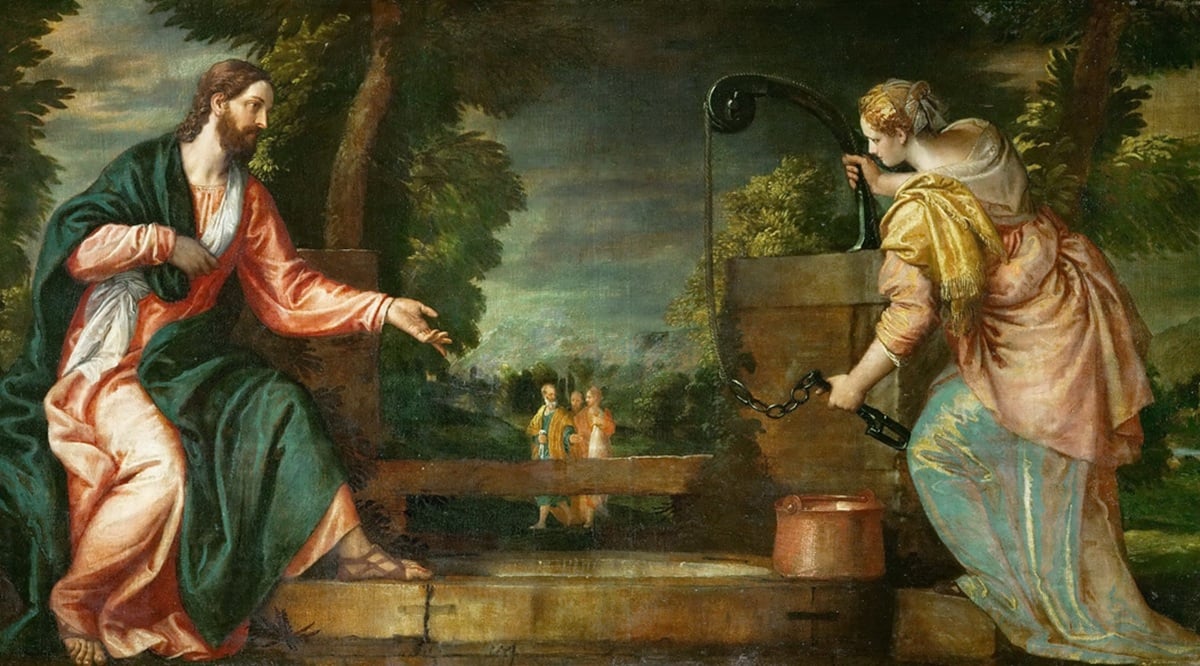The Bible depicts God as a divine Wellspring, the Source of all that is. Renaming God as Wellspring and Source can lead to liberation.

In this series, “Renaming God,” we discuss the benefits of finding alternative names for the Divine. For one thing, many people find traditional names for God difficult because of their cultural background, theological issues, religious trauma, or other reasons.
Some people want to believe in God but feel they must abandon the language of patriarchy and politics, along with models of judgment and militarism. In this instance, titles like “King,” “Lord,” and “Judge” no longer work. Others have given up anthropomorphic names for God altogether. For these people, names like “Father,” “Son,” and “Friend of Sinners” seem like a stretch. So, renaming God may be necessary to preserve faith.
For another thing, calling God “God” all the time can get boring. Giving up on old names for God creates a vacuum if you don’t find new things to call The Divine. In each article of this series, I present suggestions for new names you might want to call God. We have already looked at the names:
Today, I want to suggest the names “Wellspring” and “Source.”
Wellspring
The Hebrew Bible
Strike the Rock
The Hebrew Bible depicts God as a divine Wellspring. In Exodus 17:1-7, God instructs Moses to bring water from a rock to feed a thirsty nation:
From the wilderness of Sin the whole congregation of the Israelites journeyed by stages, as the Lord commanded. They camped at Rephidim, but there was no water for the people to drink. 2 The people quarreled with Moses and said, “Give us water to drink.” Moses said to them, “Why do you quarrel with me? Why do you test the Lord?” 3 But the people thirsted there for water, and the people complained against Moses and said, “Why did you bring us out of Egypt, to kill us and our children and livestock with thirst?” 4 So Moses cried out to the Lord, “What shall I do for this people? They are almost ready to stone me.” 5 The Lord said to Moses, “Go on ahead of the people and take some of the elders of Israel with you; take in your hand the staff with which you struck the Nile and go. 6 I will be standing there in front of you on the rock at Horeb. Strike the rock, and water will come out of it, so that the people may drink.” Moses did so, in the sight of the elders of Israel. 7 He called the place Massah and Meribah because the Israelites quarreled and tested the Lord, saying, “Is the Lord among us or not?”
As the divine Wellspring, God allows the people to drink from Godself. Thus, God preserves the nation and shows a divine identity as the fountain of life.
Speak to the Rock
On a separate occasion, in Numbers 20:1-13, God tells Moses to speak to the rock so that living water can flow.
The Israelites, the whole congregation, came into the wilderness of Zin in the first month, and the people stayed in Kadesh. Miriam died there and was buried there.
2 Now there was no water for the congregation, so they gathered together against Moses and against Aaron. 3 The people quarreled with Moses and said, “Would that we had died when our kindred died before the Lord! 4 Why have you brought the assembly of the Lord into this wilderness for us and our livestock to die here? 5 Why have you brought us up out of Egypt to bring us to this wretched place? It is no place for grain or figs or vines or pomegranates, and there is no water to drink.” 6 Then Moses and Aaron went away from the assembly to the entrance of the tent of meeting; they fell on their faces, and the glory of the Lord appeared to them. 7 The Lord spoke to Moses, saying, 8 “Take the staff, and assemble the congregation, you and your brother Aaron, and command the rock before their eyes to yield its water. Thus you shall bring water out of the rock for them; thus you shall provide drink for the congregation and their livestock.”
9 So Moses took the staff from before the Lord, as he had commanded him. 10 Moses and Aaron gathered the assembly together before the rock, and he said to them, “Listen, you rebels; shall we bring water for you out of this rock?” 11 Then Moses lifted up his hand and struck the rock twice with his staff; water came out abundantly, and the congregation and their livestock drank. 12 But the Lord said to Moses and Aaron, “Because you did not trust in me, to show my holiness before the eyes of the Israelites, therefore you shall not bring this assembly into the land that I have given them.” 13 These are the waters of Meribah, where the Israelites quarreled with the Lord and through which he showed himself to be holy.
In this instance, Moses shows himself faithless by disobeying God’s instructions, which were to simply speak to the rock. Instead, he expects God to behave according to Moses’s own expectations. He assumes God will do as God had done before. But the Wellspring wants to do a new thing instead. By telling Moses to speak to the rock instead of striking it, God intends to demonstrate divine nonviolence. God provides what they need without any need for force or sacrifice. By his aggressive behavior, Moses ruins the imagery that God intends to create by simply speaking to the rock.
In addition, Moses allows his egotism to get in the way. The prophet takes credit for the miracle himself by saying, “Shall we bring water out of this rock?” (The “we” refers to himself and his brother Aaron, not himself and God.) For this, the Wellspring rebukes Moses because Moses’s glory-seeking detracts from God’s demonstration of Godself as the Source of life.
God Will Satisfy Your Needs
The prophet Isaiah picks up this theme of God being the source of sustenance for thirsty souls. Isaiah 58:11 says:
The Lord will guide you continually
and satisfy your needs in parched places
and make your bones strong,
and you shall be like a watered garden,
like a spring of water
whose waters never fail.
Just as Moses guides the people from waterhole to oasis, so God guides God’s people as the Wellspring of life. God satisfies our needs, makes us strong, waters us, and turns us into springs of water ourselves.
The New Testament
The Rock was Christ
Referring to the above scriptures, the apostle Paul writes:
I do not want you to be ignorant, brothers and sisters, that our ancestors were all under the cloud, and all passed through the sea, 2 and all were baptized into Moses in the cloud and in the sea, 3 and all ate the same spiritual food, 4 and all drank the same spiritual drink. For they drank from the spiritual rock that followed them, and the rock was Christ (1 Corinthians 10:1-4).
It may be splitting hairs to say this, but it’s important to note that there was no rock literally following the Israelites around in the desert. And the rocks themselves weren’t pre-incarnate appearances of Jesus. What Paul means is that these Jewish stories are examples of God as the Wellspring of life, just as Jesus demonstrates himself to be the Source of life in the New Testament. The rocks weren’t God—but God as the divine Wellspring nourished the people.
The Living Water
In John 4:1-41, Jesus encounters a remarkable woman when he visits a well in a Samaritan town. She starts out as a skeptic, but by the end of the story, she becomes an evangelist, telling her whole town about Jesus. As he approaches the well, he asks her to draw him some water. She answers his question with another question, curious why a Jewish man would ask a Samaritan woman for such a favor. Verses 10-15 say:
Jesus answered her, “If you knew the gift of God and who it is that is saying to you, ‘Give me a drink,’ you would have asked him, and he would have given you living water.” 11 The woman said to him, “Sir, you have no bucket, and the well is deep. Where do you get that living water? 12 Are you greater than our ancestor Jacob, who gave us the well and with his sons and his flocks drank from it?” 13 Jesus said to her, “Everyone who drinks of this water will be thirsty again, 14 but those who drink of the water that I will give them will never be thirsty. The water that I will give will become in them a spring of water gushing up to eternal life.” 15 The woman said to him, “Sir, give me this water, so that I may never be thirsty or have to keep coming here to draw water.”
Of course, Jesus is speaking metaphorically and not identifying himself as a literal fountain of water. Instead, he makes a bolder claim: As God incarnate, Jesus is the Wellspring of Life, the divine Source of all things.
The Wellspring of Life
Finally, Revelation 22:1-2 depicts this Wellspring from beneath the divine altar, bubbling into a life-giving river.
Then the angel showed me the river of the water of life, bright as crystal, flowing from the throne of God and of the Lamb 2 through the middle of the street of the city. On either side of the river is the tree of life with its twelve kinds of fruit, producing its fruit each month, and the leaves of the tree are for the healing of the nations.
As the river flows from the throne, we are to understand that its origins are actually from God. The flow that nourishes parched Israelites in the desert is the same fountain that Jesus offers to the woman at the well. This is the same Wellspring that creates, preserves, and restores all things.
The Source
Other Meanings of “Source”
Related to God’s name as the Wellspring, I also suggest another name: The Source. The word “Source” has several meanings. In case we missed any, I want to highlight the significance of each. Dictionary.com says the name also means:
- “Any thing or place from which something comes, arises, or is obtained; origin.” The dictionary gives the example: “Which foods are sources of calcium?” With God as a source in this sense, God is the resource from which we all draw.
- “A book, statement, person, etc., supplying information.” As such, God as the Source is our authority for Truth. As journalists quote sources, and as police investigators refer to informants s sources, so God is the ultimate Source.
- “A manufacturer or supplier.” Similarly, God is the manufacturer of the universe, the provider of all good things.
God as the Source of All Things
While it’s difficult to find Bible verses that refer to God as The Source (as if it were a name), scriptures abound depicting God as the source of all things. Here are just three examples:
- Genesis 1:1-3 – When God began to create the heavens and the earth, 2 the earth was complete chaos, and darkness covered the face of the deep, while a wind from God swept over the face of the waters. 3 Then God said, “Let there be light,” and there was light.
- Colossians 1:15-17 – He is the image of the invisible God, the firstborn of all creation, 16 for in him all things in heaven and on earth were created, things visible and invisible, whether thrones or dominions or rulers or powers—all things have been created through him and for him. 17 He himself is before all things, and in[j]him all things hold together.
- James 1:17-18 – Every generous act of giving, with every perfect gift, is from above, coming down from the Father of lights, with whom there is no variation or shadow due to change. 18 In fulfillment of his own purpose he gave birth to us by the word of truth, so that we would become a kind of first fruits of his creatures.
I invite you to do the research yourself and find the nearly inexhaustible selection of biblical texts depicting God as the Source, even if the scriptures use a different term.
A Tiny Trickle
Historically, explorers have mounted expensive expeditions to discover the sources of great rivers like the Amazon, the Ganges, and the Nile. These sources are more than just streams or rivers. They are wellsprings—the place where the river is born. The origin of flow.
Human beings have always been fascinated by the headwaters of a great watercourse. If you follow a river upstream from the ocean, you can choose any tributary that will lead you to streams and creeks that feed into it. Eventually, you will come to a tiny spring—a trickle that seems to come from nowhere. Water from a rock.
Small Beginnings
When we say that God is the Source of all things, it’s easy to imagine greatness. Miraculous flow with mystical meaning. But understanding God as the divine Source must also recognize the reality of small beginnings. All things flow from God. All things originate from the Wellspring of Life. But this should engender humility instead of hubris. It should invite us to consider our own small starts. It should unite us with things that are weak and feeble. You can see the divine in a mere trickle, just as surely as you experience God in the crashing ocean.
New Names for God
The term “Wellspring” is sometimes heard in the Church, yet you don’t usually hear it as a name for God. Why not try it on to see if it works for you?
“The Source” is not typically used as a name for God among Christians, either. Yet, a growing number of people outside the Church are beginning to refer to God as the Source. This term may give you some commonality with people outside ecclesiastical circles.
For those who have experienced trauma or baggage surrounding the word “God,” the names “Wellspring” and “Source” can be more generic and more comforting. They aren’t specific to any particular doctrine or dogma. They simply recognize that there is Something bigger from which we all come and from which we all draw life. This Something is the Originator, Provider, and Authority on all things. I invite you to these alternative names for God to see how they can help you relate differently to the Divine.














